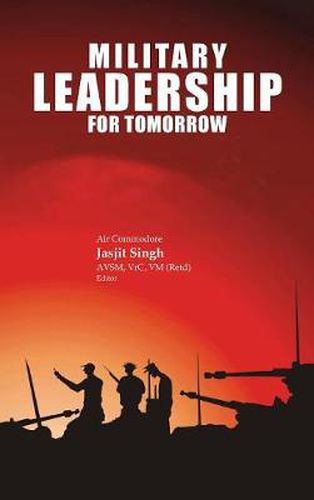Readings Newsletter
Become a Readings Member to make your shopping experience even easier.
Sign in or sign up for free!
You’re not far away from qualifying for FREE standard shipping within Australia
You’ve qualified for FREE standard shipping within Australia
The cart is loading…






This title is printed to order. This book may have been self-published. If so, we cannot guarantee the quality of the content. In the main most books will have gone through the editing process however some may not. We therefore suggest that you be aware of this before ordering this book. If in doubt check either the author or publisher’s details as we are unable to accept any returns unless they are faulty. Please contact us if you have any questions.
A leader, military, political or in any other profession, is inevitably a lonely person, and yet a successful leader, especially in the military profession, must be a very sensitive person to be able to lead successfully through the motivation, dedication and loyalty of those he leads. In the military profession, of course, this acquires even greater salience since the profession, at one level, demands a willingness and readiness to make the supreme sacrifice, and, at another, involves victory or defeat of the country that nurtures its military power. According to an American saying, There are three types of leaders: those who make things happen, those that watch things happen, and those who wonder what happened! This is why the military needs leaders of the first kind, and who can not only manage and motivate people, but also ideas and concepts for which they must acquire knowledge on a broad basis. Modern military power is highly technology oriented and even dominated by it. Current trends indicate that this will increase in future. Contrary to conventional wisdom, this will increase the premium on the quality of the man dealing with the machine at all levels. In the air forces, this would matter even more since so much will depend on so few. We need strategists at all levels; and the chiefs of the armed forces of 2040 are already in active service. They would have to provide military professional advice to the political leadership at crucial times under enormous uncertainties where actionable intelligence would not be available, and their own knowledge and experience would have to guide them. To enable them to do so successfully, these officers would have to be given broad-based education and knowledge. Above all, successful military leadership would require very high standards of professional integrity as well as personal integrity - at all levels. This volume brings together eminent experts well versed in the theory and practice of leadership and the knowledge that needs to be available to them. The issues explored in this volume are equally applicable to other professions, especially in the corporate world.
$9.00 standard shipping within Australia
FREE standard shipping within Australia for orders over $100.00
Express & International shipping calculated at checkout
This title is printed to order. This book may have been self-published. If so, we cannot guarantee the quality of the content. In the main most books will have gone through the editing process however some may not. We therefore suggest that you be aware of this before ordering this book. If in doubt check either the author or publisher’s details as we are unable to accept any returns unless they are faulty. Please contact us if you have any questions.
A leader, military, political or in any other profession, is inevitably a lonely person, and yet a successful leader, especially in the military profession, must be a very sensitive person to be able to lead successfully through the motivation, dedication and loyalty of those he leads. In the military profession, of course, this acquires even greater salience since the profession, at one level, demands a willingness and readiness to make the supreme sacrifice, and, at another, involves victory or defeat of the country that nurtures its military power. According to an American saying, There are three types of leaders: those who make things happen, those that watch things happen, and those who wonder what happened! This is why the military needs leaders of the first kind, and who can not only manage and motivate people, but also ideas and concepts for which they must acquire knowledge on a broad basis. Modern military power is highly technology oriented and even dominated by it. Current trends indicate that this will increase in future. Contrary to conventional wisdom, this will increase the premium on the quality of the man dealing with the machine at all levels. In the air forces, this would matter even more since so much will depend on so few. We need strategists at all levels; and the chiefs of the armed forces of 2040 are already in active service. They would have to provide military professional advice to the political leadership at crucial times under enormous uncertainties where actionable intelligence would not be available, and their own knowledge and experience would have to guide them. To enable them to do so successfully, these officers would have to be given broad-based education and knowledge. Above all, successful military leadership would require very high standards of professional integrity as well as personal integrity - at all levels. This volume brings together eminent experts well versed in the theory and practice of leadership and the knowledge that needs to be available to them. The issues explored in this volume are equally applicable to other professions, especially in the corporate world.